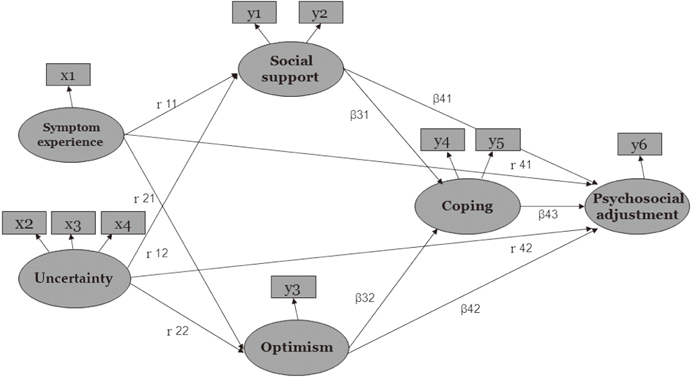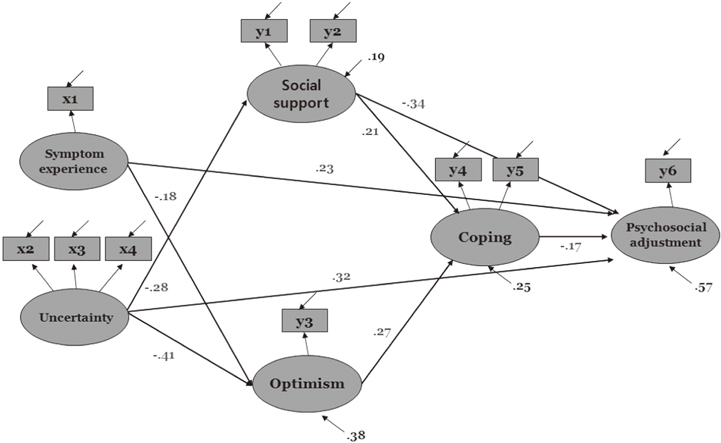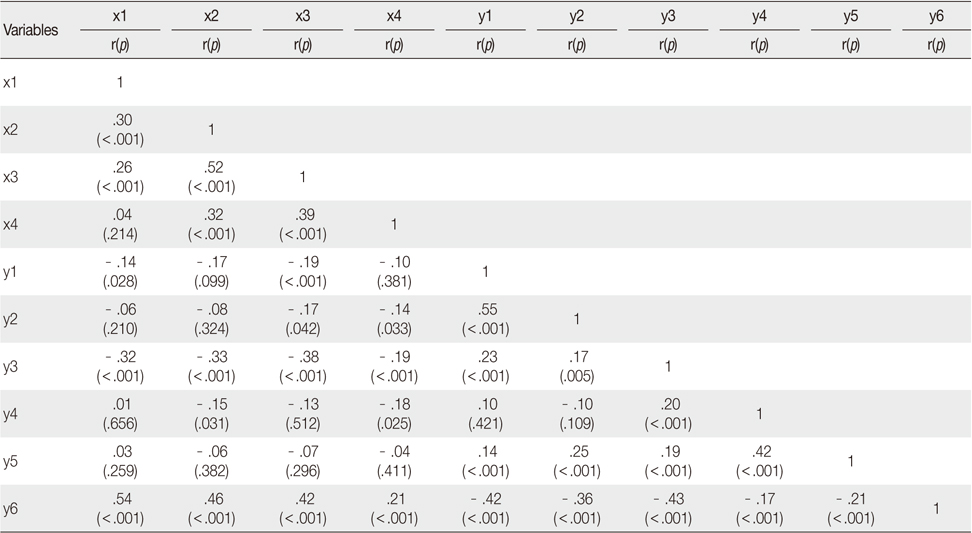Articles
- Page Path
- HOME > J Korean Acad Nurs > Volume 42(1); 2012 > Article
-
Original Article
- A Structural Model for Psychosocial Adjustment in Patients with Early Breast Cancer
- Hye Young Kim, Hyang Sook So
-
Journal of Korean Academy of Nursing 2012;42(1):105-115.
DOI: https://doi.org/10.4040/jkan.2012.42.1.105
Published online: February 29, 2012
1Assistant Professor, Department of Nursing, Gwangju Women's University, Gwangju, Korea.
2Professor, College of Nursing, Chonnam National University, Gwangju, Korea.
- Address reprint requests to: So, Hyang Sook. College of Nursing, Chonnam National University, 5, Hak-1dong, Dong-gu, Gwangju 501-746, Korea. Tel: +82-62-220-4361, +82-62-530-4930, FAX: +82-62-227-4009, hsso@chonnam.ac.kr
© 2012 Korean Society of Nursing Science
- 1,479 Views
- 13 Download
- 24 Crossref
Abstract
-
Purpose
- This study was done to propose a structural model to explain and predict psychosocial adjustment in patients with early breast cancer and to test the model. The model was based on the Stress-Coping Model of Lazarus and Folkman (1984).
-
Methods
- Data were collected from February 18 to March 18, 2009. For data analysis, 198 data sets were analyzed using SPSS/WIN12 and AMOS 7.0 version.
-
Results
- Social support, uncertainty, symptom experience, and coping had statistically significant direct, indirect and total effects on psychosocial adjustment, and optimism had significant indirect and total effects on psychosocial adjustment. These variables explained 57% of total variance of the psychosocial adjustment in patients with early breast cancer.
-
Conclusion
- The results of the study indicate a need to enhance psychosocial adjustment of patients with early breast cancer by providing detailed structured information and various symptom alleviation programs to reduce perceived stresses such as uncertainty and symptom experience. They also suggest the need to establish support systems through participation of medical personnel and families in such programs, and to apply interventions strengthening coping methods to give the patients positive and optimistic beliefs.
This article is based on a part of the first author's doctoral thesis from Chonnam National University.
- 1. Bae B.L. Structural equation modeling with AMOS 7. 2007;Seoul, Chung Ram Book Publisher.
- 2. Ben-Zur H., Gilbar O., Lev S. Coping with breast cancer: Patient, spouse, and dyad models. Psychosomatic Medicine. 2001;63:32–39.ArticlePubMed
- 3. Budin W.C. Psychosocial adjustment to breast cancer in unmarried women. Research in Nursing and Health. 1998;21:155–166.ArticlePubMed
- 4. Carver C.S., Pozo C., Harris S.D., Noriega V., Scheier M.F., Robinson D.S., et al. How coping mediates the effect of optimism on distress: A study of women with early stage breast cancer. Journal of Personality and Social Psychology. 1993;65:375–390.ArticlePubMed
- 5. Cho O.H. Uncertainty, anxiety and coping with mastectomy for breast cancer. Journal of Korean Academy of Nursing. 2000;30:1006–1017.ArticlePDF
- 6. Christman N.J., McConnell E.A., Pfeiffer C., Webster K.K., Schmitt M., Ries J. Uncertainty, coping, and distress following myocardial infarction: Transition from hospital to home. Research in Nursing and Health. 1988;11(2):71–82.ArticlePubMed
- 7. Cohen F., Lazarus R.S. Stone G.C., Cohen F., Adler N.E. Coping with the stress of illness. In: Health psychology: A handbook. 1979;San Francisco, Jossey-Bass. 217–254.
- 8. Davis L.A. Hardiness, social support, uncertainty, and adjustment in women clinically free of breast cancer. 1997;Brimingham, U.S.A, Alabama University. Unpublished doctoral dissertation.
- 9. Derogatis L.R., Lopez M. The psychosocial adjustment to illness scale: Administration, scoring, and procedures manual I. 1983;Baltimore, Clinical Psychometric Research.
- 10. Dukes H.K., Holahan C.K. The relation of social support and coping to positive adaptation to breast cancer. Psychology and Health. 2003;18:15–29.Article
- 11. Folkman S., Lazarus R.S. If it changes it must be a process: Study of emotion and coping during three stages of a college examination. Journal of Personality and Social Psychology. 1985;48:150–170.ArticlePubMed
- 12. Gotay C. The experience of cancer during early and advanced stages: The views of patients and their mates. Social Science and Medicine. 1984;18:605–613.ArticlePubMed
- 13. Hoskins C.N., Budin W.C. Measurement of psychosocial adjustment to breast cancer: A unidimensional or multidimensional construct. Psychological Reports. 2000;87:649–663.ArticlePubMed
- 14. Kim G.S. Analysis structural equation modeling. 2007;Seoul, SPSS Academy Series.
- 15. Kirsner R.S., Ma F., Fleming L.E., Federman D.D., Rapido E., Duncan R., et al. Earlier stage at diagnosis and improved survival among Medicare HMO patients with breast cancer. Journal of Women's Health. 2010;19:1619–1624.Article
- 16. Lazarus R.S., Folkman A. Monat A., Lazarus R. Stress and coping: Some current issues and controversies. In: Stress and coping: An anthology. 1984;New York, NY, Columbia university press. 1–11.
- 17. Lee Y.J., Ham E.M., Kim K.S. A correlational study on uncertainty, coping and depression of cancer patients. Journal of Korean Academy of Nursing. 2001;31:244–256.ArticlePDF
- 18. Mazanec S.R., Daly B.J., Douglas S., Musil C. Predictors of psychosocial adjustment during the postradiation treatment transition. Western Journal of Nursing Research. 2011;33:540–559. http://dx.doi.org/10.1177/0193945910382241.ArticlePubMedPDF
- 19. Mishel M.H. The measurement of uncertainty in illness. Nursing Research. 1981;30:258–263.PubMed
- 20. Mishel M.H. Uncertainty in illness. Journal of Nursing Scholarship. 1988;20:225–232.Article
- 21. Mishel M.H., Sorenson D. Revision of the ways of coping checklist for a clinical population. Western Journal of Nursing Research. 1993;15:59–76.ArticlePubMedPDF
- 22. National cancer statistics. National Cancer Information Center. 2008;Retrieved October 10, 2008. from http://www.cancer.go.kr.
- 23. Samarel N., Leddy S.K., Greco K., Cooley M.E., Torres S.C., Tulman L., et al. Development and testing of the symptom experience scale. Journal of Pain and Symptom Management. 1996;12:221–228.ArticlePubMed
- 24. Saneha C. Relationships among optimism, cognitive appraisal, coping strategies, and psychosocial adjustment in Thai women newly diagnosed with breast cancer. 2006;03;In: Poster session presented at the 9th East Asian Forum of Nursing Scholars; Bangkok.
- 25. Scheier M.F., Carver C.S., Bridges M.W. Distinguishing optimism from neuroticism and trait anxiety, self mastery, and self-esteem: A reevaluation of the life orientation test. Journal of Personality and Social Psychology. 1994;67:1063–1078.ArticlePubMed
- 26. So H.S. Changes on the uncertainly, ways of coping, and depression for patients with uterine cervical cancer during the early adaptation process: A longitudinal study. 1996;Seoul, Yonsei University. Unpublished doctoral dissertation.
- 27. Tae Y.S., Kang E.S., Lee M.H., Park G.J. The relationship among percieved social support, hope and quality of life of cancer patients. Korean Journal of Rehabilitation Nursing. 2001;4:219–231.
- 28. Thewes B., Butow P., Girgis A., Pendlebury S. The psychosocial needs of breast cancer survivors: A qualitative study of the shared and unique needs of younger versus older survivors. Psycho-oncology. 2004;13:177–189. http://dx.doi.org/10.1002/pon.710.ArticlePubMed
- 29. Vos P.J., Garssen B., Visser A.P., Duivenvoorden H.J., de Haes H.C. Early stage breast cancer: Explaining level of psychosocial adjustment using structural equation modeling. Journal of Behavioral Medicine. 2004;27:557–580.ArticlePubMedPDF
- 30. Westbrook J.M. Attachment, optimism, coping, and social support as predictors of psychosocial and psychological adjustment in women with breast cancer. 2005;Santa Barbara, U.S.A, Fielding Graduate University. Unpublished Doctoral dissertation.
REFERENCES

Figure & Data
REFERENCES
Citations

- The Influencing Factors of Psychosocial Adaptation of Cancer Patients: A Systematic Review and Meta-Analysis
Hanjing Zhu, Linning Yang, Hongfan Yin, Xia Yuan, Jia Gu, Yan Yang
Health Services Insights.2024;[Epub] CrossRef - Psychosocial adjustment and its influencing factors among head and neck cancer survivors after radiotherapy: A cross-sectional study
Liying Wen, Yuanyuan Cui, Xingyu Chen, Chong Han, Xinghua Bai
European Journal of Oncology Nursing.2023; 63: 102274. CrossRef - Investigation of Factors Influencing the Fear of Cancer Recurrence in Breast Cancer Patients Using Structural Equation Modeling: A Cross-Sectional Study
Hai-Tao Guo, Shuang-Shuang Wang, Chun-Fang Zhang, Hong-Jie Zhang, Min-Xiang Wei, Yu Wu, Chen-Xiao Su, Dimitrios Mantas
International Journal of Clinical Practice.2022; 2022: 1. CrossRef - Factors Affecting Depression in Nursing Students during the COVID-19 Pandemic
Jeong Rim Koh, Jaehee Jeon
Korean Journal of Adult Nursing.2022; 34(4): 380. CrossRef - Development of the Uncertainty Scale for Women Hospitalized With High-Risk Pregnancies in South Korea
Hyun Jin Kim, Hye-Ah Yeom
Journal of Obstetric, Gynecologic & Neonatal Nursing.2022; 51(1): 89. CrossRef - Structural Equation Model for Psychosocial Adjustment of Breast Cancer Survivors Based on Family Resilience Model
Jiyoung Seo, Myungsun Yi
Korean Journal of Adult Nursing.2022; 34(2): 178. CrossRef - Factors affecting anxiety and depression in young breast cancer survivors undergoing radiotherapy
Kisook Kim, Hyesun Park
European Journal of Oncology Nursing.2021; 50: 101898. CrossRef - Impact of Psycho-Social Factors on Fatigue among Breast Cancer Patients Who Are Currently Undergoing Radiotherapy
Hyesun Park, Kisook Kim
International Journal of Environmental Research and Public Health.2020; 17(17): 6092. CrossRef - Relationship between cancer stigma, social support, coping strategies and psychosocial adjustment among breast cancer survivors
No Eul Kang, Hye Young Kim, Ji Young Kim, Sung Reul Kim
Journal of Clinical Nursing.2020; 29(21-22): 4368. CrossRef - A predictive model of fear of cancer recurrence for patients undergoing chemotherapy
Se Jin Hong, Nah-Mee Shin, Sunyoung Jung
Supportive Care in Cancer.2020; 28(9): 4173. CrossRef - The mediating effect of social support on uncertainty in illness and quality of life of female cancer survivors: a cross-sectional study
Insook Lee, Changseung Park
Health and Quality of Life Outcomes.2020;[Epub] CrossRef - Stress, Social Support, and Sexual Adjustment in Married Female Patients with Breast Cancer in Korea
Jiyoung Kim, Miyoung Jang
Asia-Pacific Journal of Oncology Nursing.2020; 7(1): 28. CrossRef - The Mediating Effect of Workplace Spirituality on the Relation between Job Stress and Job Satisfaction of Cancer Survivors Returning to Work
Ju-Hyun Jin, Eun-Ju Lee
International Journal of Environmental Research and Public Health.2019; 16(19): 3510. CrossRef - A structural model for stress, coping, and psychosocial adjustment: A multi-group analysis by stages of survivorship in Korean women with breast cancer
Miyoung Jang, Jiyoung Kim
European Journal of Oncology Nursing.2018; 33: 41. CrossRef - Factors Affecting Psychosocial Adjustment in Patients with Surgical Removal of Benign Breast Tumor
Hyunsook Kim, Myoungha Lee, Hyeyoung Kim, Juhee Nho
Korean Journal of Women Health Nursing.2018; 24(2): 163. CrossRef - Impact of Uncertainty on the Quality of Life of Young Breast Cancer Patients: Focusing on Mediating Effect of Marital Intimacy
Yeong Kyong Oh, Seon Young Hwang
Journal of Korean Academy of Nursing.2018; 48(1): 50. CrossRef - Effects of Video-centered Nursing Education Program on Anxiety, Uncertainty, and Self-care among Cataract Surgery Patients
Hyang Hee Jeon, Soo Jin Lee
Korean Journal of Adult Nursing.2018; 30(5): 482. CrossRef - Symptom Distress and Coping in Young Korean Breast Cancer Survivors: The Mediating Effects of Social Support and Resilience
Ji Hyun Lee, Hye Young Kim
Journal of Korean Academy of Nursing.2018; 48(2): 241. CrossRef - Factors that Influence Korean Breast Cancer Patients to Undergo Cancer Rehabilitation Therapy
Hui-jeong Park, Kyunghee Kim, Ji-su Kim
Asian Oncology Nursing.2015; 15(2): 106. CrossRef - The Influence of Stress, Spousal Support, and Resilience on the Ways of Coping among Women with Breast Cancer
Jiyoung Kang, Eunyoung E. Suh
Asian Oncology Nursing.2015; 15(1): 1. CrossRef - A Prediction Model for the Resilience and the Quality of Life in Cancer Patients with Radiotherapy
So Yeun Jun, Hyeon Jeong Ju, Je Sang Yu, Ji Hyun Lee
Asian Oncology Nursing.2015; 15(4): 228. CrossRef - The Mediating Effects of Self-Esteem and Optimism on the Relationship between Quality of Life and Depressive Symptoms of Breast Cancer Patients
Eun Hye Ha, Young Kyung Cho
Psychiatry Investigation.2014; 11(4): 437. CrossRef - Coping with colorectal cancer: a qualitative exploration with patients and their family members
G. B. Asiedu, R. W. Eustace, D. T. Eton, C. Radecki Breitkopf
Family Practice.2014; 31(5): 598. CrossRef - Effects of Cancer-Overcome BeHaS Exercise Program on Shoulder External Rotation, Cancer Coping and Group Cohesion in Mastectomy Patients
Sun Ae Kim, Jong Im Kim, Sun Young Park, Shin Hong Min
Journal of muscle and joint health.2012; 19(3): 319. CrossRef


Figure 1
Figure 2
Descriptive Statistics of Variables (N=198)
VIF=Variation inflation factor.
Correlation among the Research Variables (N=198)
x1=Symptom experience; x2=Ambiguity; x3=Complexity; x4=Unpredictability;
y1=Family support; y2=Medical staff support; y3=Optimism; y4=Problem focused coping; y5=Emotional focused coping; y6=Psychosocial adjustment.
VIF=Variation inflation factor.
x1=Symptom experience; x2=Ambiguity; x3=Complexity; x4=Unpredictability; y1=Family support; y2=Medical staff support; y3=Optimism; y4=Problem focused coping; y5=Emotional focused coping; y6=Psychosocial adjustment.
 KSNS
KSNS
 E-SUBMISSION
E-SUBMISSION



 Cite
Cite

